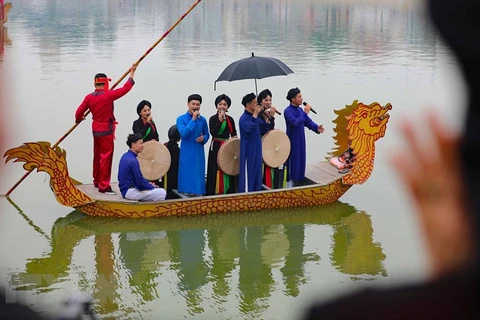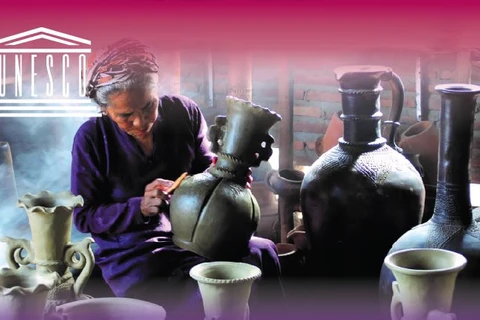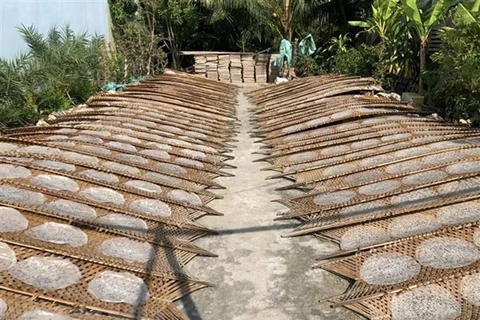 The art of Xoe dance of the Thai ethnic minority people was recognised by UNESCO as an intangible cultural heritage of humanity in 2021.
The art of Xoe dance of the Thai ethnic minority people was recognised by UNESCO as an intangible cultural heritage of humanity in 2021. Hanoi (VNA) – Vietnam has exerted great efforts to preserve its intangible cultural heritages and gained remarkable achievements in this field. These efforts have contributed to the implementation of the UNESCO Convention for the Safeguarding of the Intangible Cultural Heritage that the country joined 20 years ago.
Intangible cultural heritage of humanity
An intangible cultural heritage is a spiritual product, encompassing both individual and communal expressions. It includes objects and cultural spaces that are connected to communities, possessing historical, cultural, and scientific values while reflecting the distinct identity of those communities.
According to UNESCO, intangible cultural heritage does not only represent inherited traditions from the past but also contemporary rural and urban practices in which diverse cultural groups take part.
Intangible cultural heritage is not merely valued as a cultural product, on a comparative basis, for its exclusivity or its exceptional value. It thrives on its basis in communities and depends on those whose knowledge of traditions, skills and customs are passed on to the rest of the community, from generation to generation, or intermixed with similar traditions in other communities.
 The art of “Hat Xoan” (Xoan singing) of Vietnam was recognised by UNESCO as an intangible cultural heritage of humanity in 2017 (Photo: VietnamPlus)
The art of “Hat Xoan” (Xoan singing) of Vietnam was recognised by UNESCO as an intangible cultural heritage of humanity in 2017 (Photo: VietnamPlus) As of April 2023, as many as 676 intangible cultural heritages from 140 countries and territories worldwide were recognised by UNESCO.
China is currently leading with 43 recognised items, followed by France with 26 items.
With 15 inscribed in the list of intangible cultural heritages, Vietnam was among the top 10 countries with the greatest number of recognised items. Among these, 14 are intangible cultural heritages of humanity, and one is included in the list of intangible cultural heritage in need of urgent safeguarding. The heritages, owned by different ethnic groups, are located in many provinces and cities nationwide.
Vietnam has prepared dossiers to seek UNESCO recognition for 13 more items to the list of intangible cultural heritages, including 11 intangible cultural heritages of humanity and two in need of urgent safeguarding.
National intangible cultural heritages
In Vietnam, localities are responsible for compiling and categorising intangible cultural heritage items, then submit them to the Ministry of Culture, Sports and Tourism for recognition as national intangible cultural heritages. They are also tasked with implementing state management of the recognised national intangible cultural heritages in accordance with legal regulations on cultural heritages.
 Photo: The "Fire dance ceremony of the Pa Then ethnic minority group" in Tuyen Quang province was recognised as a national intangible cultural heritage (Photo: VNA)
Photo: The "Fire dance ceremony of the Pa Then ethnic minority group" in Tuyen Quang province was recognised as a national intangible cultural heritage (Photo: VNA) Vietnam's national intangible cultural heritages include various forms such as traditional festivals, folk performing arts, social practices and beliefs, traditional crafts, and folk knowledge, among others.
According to statistics from the Heritage Department under the Ministry of Culture, Sports and Tourism, as of June 2021, there were 395 recognised national intangible cultural heritages in the country. The most common types among them are traditional festivals, folk performing arts, and social practices and beliefs.
The conservation and preservation of intangible cultural heritage hold immense significance in the development of each ethnic group and nation, importantly contributing to enriching the national culture.
 With its exceptional cultural value, the Quan Ho Bac Ninh folk songs were inscribed in the Representative List of the Intangible Cultural Heritage of Humanity in 2009. (Photo: VNA)
With its exceptional cultural value, the Quan Ho Bac Ninh folk songs were inscribed in the Representative List of the Intangible Cultural Heritage of Humanity in 2009. (Photo: VNA) On September 20, 2005, Vietnam joined the Convention for the Safeguarding of the Intangible Cultural Heritage (2003 Convention), becoming one of its first 30 official members.
The country’s efforts to contribute to the preservation and promotion of such heritages over the past two decades have won recognition from the international community, as demonstrated in the country’s membership of the Intergovernmental Committee for the Safeguarding of Intangible Cultural Heritage for two times.
According to the Cultural Heritage Department under the Ministry of Culture, Sports and Tourism, in line with Vietnam's commitments to UNESCO, projects on the conservation and promotion of these intangible cultural heritages have been either already in place or under development.
After its first term at the Intergovernmental Committee for the Safeguarding of Intangible Cultural Heritage for 2006-2010, which ended with success, on July 6 last year, Vietnam was elected to the committee for the 2022-2026 term, with 120 votes – the highest among the elected countries. The committee, consisting of 24 members, aims to promote the objectives of the Convention, provide guidance on best practices, and make recommendations on measures for the safeguarding of the intangible cultural heritage./.






















